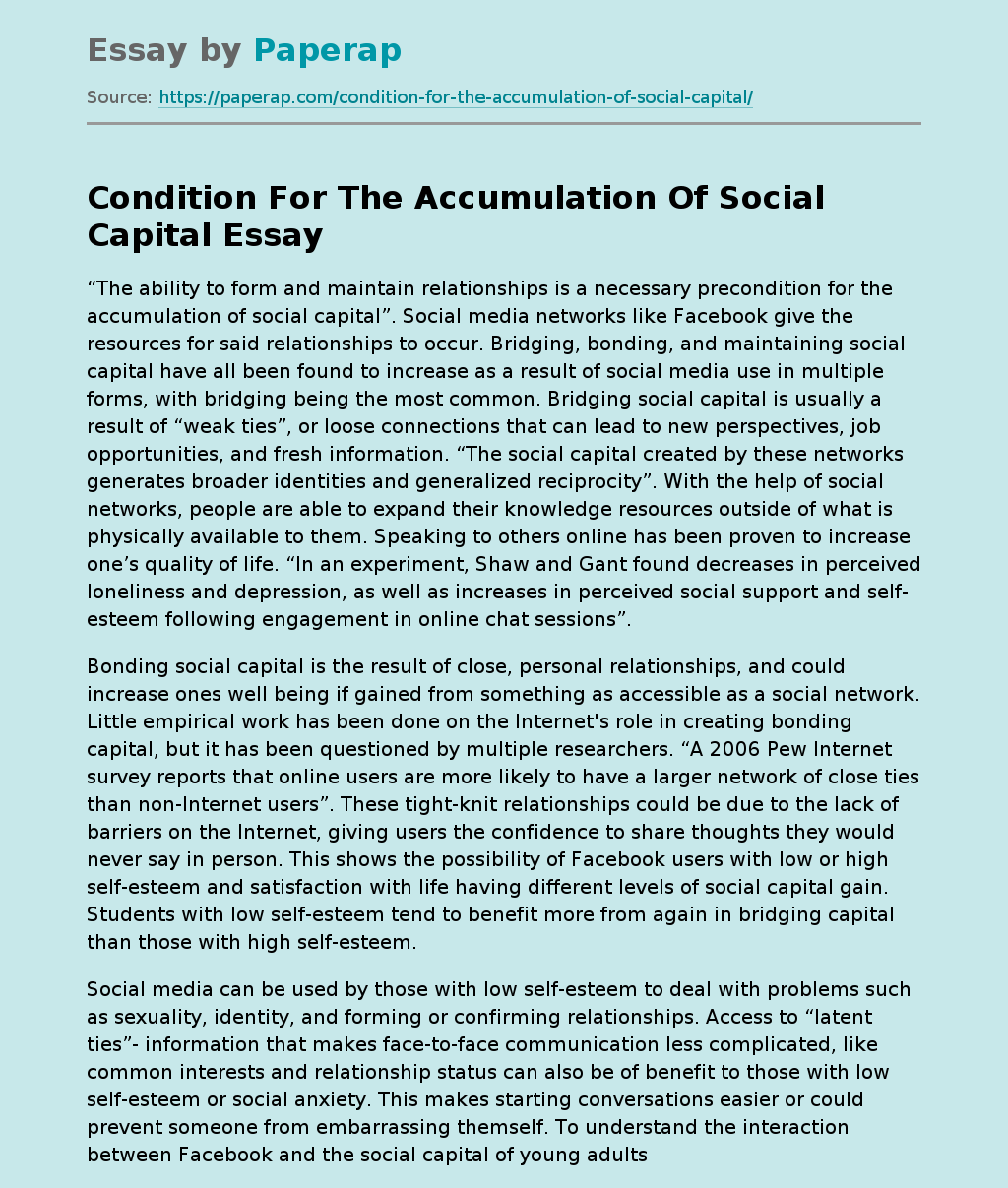Condition For The Accumulation Of Social Capital
“The ability to form and maintain relationships is a necessary precondition for the accumulation of social capital”. Social media networks like Facebook give the resources for said relationships to occur. Bridging, bonding, and maintaining social capital have all been found to increase as a result of social media use in multiple forms, with bridging being the most common. Bridging social capital is usually a result of “weak ties”, or loose connections that can lead to new perspectives, job opportunities, and fresh information.
“The social capital created by these networks generates broader identities and generalized reciprocity”. With the help of social networks, people are able to expand their knowledge resources outside of what is physically available to them. Speaking to others online has been proven to increase one’s quality of life. “In an experiment, Shaw and Gant found decreases in perceived loneliness and depression, as well as increases in perceived social support and self-esteem following engagement in online chat sessions”.
Bonding social capital is the result of close, personal relationships, and could increase ones well being if gained from something as accessible as a social network.
Little empirical work has been done on the Internet’s role in creating bonding capital, but it has been questioned by multiple researchers. “A 2006 Pew Internet survey reports that online users are more likely to have a larger network of close ties than non-Internet users”. These tight-knit relationships could be due to the lack of barriers on the Internet, giving users the confidence to share thoughts they would never say in person.
This shows the possibility of Facebook users with low or high self-esteem and satisfaction with life having different levels of social capital gain. Students with low self-esteem tend to benefit more from again in bridging capital than those with high self-esteem.
Social media can be used by those with low self-esteem to deal with problems such as sexuality, identity, and forming or confirming relationships. Access to “latent ties”- information that makes face-to-face communication less complicated, like common interests and relationship status can also be of benefit to those with low self-esteem or social anxiety. This makes starting conversations easier or could prevent someone from embarrassing themself. To understand the interaction between Facebook and the social capital of young adults, researchers first must find how the social media network is being utilized. Although the possibilities are endless, it was found that most college students use it to maintain friendships from high school that may be limited due to being enrolled in separate universities.
Time spent on Facebook is mostly used to read and respond to messages. Things like friend lists, tagging, and messaging help relationships remain strong. In a study conducted by Guadalupe Espinoza and associates, 81% of a total of 131 Los Angeles psychology students claimed to create a Facebook account “primarily for social reasons that involved people from their offline lives, such as keeping in touch with friends they do not see often “. The majority of those using a social media only follow people they already know, rather than random accounts. Social networks can also be used to strengthen communities such as dorm halls, sororities, school organizations, and shared classes. This comes in handy when planning group projects, charity events, or parties. Students who struggle with shyness or social anxiety are able to take advantage of these online communities and feel more connected.
The frequent claim that social media separates its users from the outside world has been proven a myth in multiple cases. Only 2.5% of the psychology students mentioned before felt that social networking sites held a negative impact on real-life relationships, while the majority felt that it had no impact at all. 21% of those studied who did not have a social media account actually felt isolated from their friends who did.If anything, social media has been shown to bring people together and make relationships easier to maintain, rather than isolate its users from the physical world. A large overlap between offline and online friends confirms this claim. While very few demographics such as gender and race seem to matter in these studies, the intensity of use is quite possibly the most important. Ellison et al 2007 believed that frequent use is connected with the creation and “maintenance” of social capital.
Condition For The Accumulation Of Social Capital. (2021, Dec 15). Retrieved from https://paperap.com/condition-for-the-accumulation-of-social-capital/

